 W
WAmyntas II was the son of the Persian official Bubares by his Macedonian wife Gygaea. He was named after his maternal grandfather, Amyntas I of Macedon, who ruled Macedon as a Persian subject since 512/511 BC. Later, king Xerxes I gave him the Carian city of Alabanda. Amyntas was possibly the direct successor of the tyrant Aridolis."Bubares, a Persian, had taken to wife Gygaea, Alexander's sister and Amyntas' daughter, who had borne to him that Amyntas of Asia who was called by the name of his mother's father, and to whom the king gave Alabanda, a great city in Phrygia, for his dwelling."
 W
WAnacharsis was a Scythian philosopher; he travelled from his homeland on the northern shores of the ancient Iran, to Athens, in the early 6th century BC, and made a great impression as a forthright and outspoken barbarian, that is, a non-Greek speaker. He very well could have been a forerunner of the Cynics, in part because of his strong, but playful, parrhesia. None of his works have survived.
 W
WAraspes, a Mede, and a friend of Cyrus the Great from his youth, contends with Cyrus that love has no power over him, but shortly afterwards refutes himself by falling in love with Pantheia, whom Cyrus had committed to his charge. He is afterwards sent to Croesus as a deserter, to inspect the condition of the enemy, and subsequently commands the right wing of Cyrus's army in the battle with Croesus.
 W
WArdumaniš was a Persian nobleman and son of Vakauka. He is sometimes considered as identical with Aspathines. He was one of the seven conspirators who killed the Magian Gaumāta, who had attempted to usurp the throne of the Achaemenids, and helped Darius the Great become king. He died in 500 BCE.
 W
WAriaramnes was a great-uncle of Cyrus the Great and the great-grandfather of Darius I, and perhaps the king of Parsa, the ancient core kingdom of Persia.
 W
WArsames was the son of Ariaramnes and perhaps briefly the king of Persia during the Achaemenid dynasty, but he gave up the throne and declared loyalty to Cyrus II of Persia. After this, Arsames most likely retired to his family estate in the Persian heartland of Parsa, and lived out the rest of his long years there peacefully, though he may nominally have exercised the duties of a "lesser king" under the authority of the "Great King". In an inscription allegedly found in Hamadan he is called "king of Persia", but some scholars believe it is a fraud, either modern or ancient. Another attestation of his reign is the Behistun Inscription, where his grandson Darius I lists him among his royal forebears and counts him among the eight kings who preceded him.
 W
WArtabanus was a son of Hystaspes, and therefore brother of Darius I as well as uncle of Xerxes I.
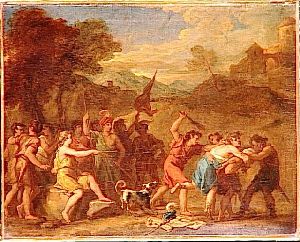 W
WArtembares was a Median nobleman whose son was whipped by a ten-year-old Cyrus. And later, according to Nicolaus of Damascus, he adopted Cyrus as a helper in the Median court. Herodotus recounts:When the boy [Cyrus] was in his tenth year, an accident which I will now relate, caused it to be discovered who he was. He was at play one day in the village where the folds of the cattle were, along with the boys of his own age, in the street. The other boys who were playing with him chose the cowherd's son, as he was called, to be their king. He then proceeded to order them about some he set to build him houses, others he made his guards, one of them was to be the king's eye, another had the office of carrying his messages; all had some task or other. Among the boys there was one, the son of Artembares, a Mede of distinction, who refused to do what Cyrus had set him. Cyrus told the other boys to take him into custody, and when his orders were obeyed, he chastised him most severely with the whip. The son of Artembares, as soon as he was let go, full of rage at treatment so little befitting his rank, hastened to the city and complained bitterly to his father of what had been done to him by Cyrus. He did not, of course, say "Cyrus," by which name the boy was not yet known, but called him the son of the king's cowherd. Artembares, in the heat of his passion, went to Astyages, accompanied by his son, and made complaint of the gross injury which had been done him. Pointing to the boy's shoulders, he exclaimed, "Thus, oh! king, has thy slave, the son of a cowherd, heaped insult upon us."At this sight and these words Astyages, wishing to avenge the son of Artembares for his father's sake, sent for the cowherd and his boy. When they came together into his presence, fixing his eyes on Cyrus, Astyages said, "Hast thou then, the son of so mean a fellow as that, dared to behave thus rudely to the son of yonder noble, one of the first in my court?" "My lord," replied the boy, "I only treated him as he deserved. I was chosen king in play by the boys of our village, because they thought me the best for it. He himself was one of the boys who chose me. All the others did according to my orders; but he refused, and made light of them, until at last he got his due reward. If for this I deserve to suffer punishment, here I am ready to submit to it."
 W
WAryandes was the first Achaemenid satrap of ancient Egypt between the 6th and 5th centuries BCE, during the early 27th Dynasty of Egypt.
 W
WAspathines or Aspačanā was a senior official under Darius the Great and Xerxes I of Persia.
 W
WAstyages was the last king of the Median Empire, r. 585–550 BCE, the son of Cyaxares; he was dethroned in 550 BCE by Cyrus the Great. His name derives from the Old Iranian Rishti Vaiga, which means "swinging the spear, lance-hurler". In the inscriptions of Nabonidus, the name is written Ishtuvegu.
 W
WBagaeus, son of Artontes, was an Achaemenid nobleman, who was ordered by Darius I to kill the rebellious satrap of Lydia, Oroetes. Oroetes was accused of having killed Mitrobates, the satrap of Daskyleion and his son, but is best known as the murderer of Polycrates of Samos. Herodotus recounts how Bagaeus used written orders from Darius in order to assure himself of the obedience of the bodyguards of Oreates to the orders of Darius, and when assured, produced a final order to kill Oroetes:So when Darius became king, he wanted to punish Oroetes for all his wrongdoing, and especially for killing Mitrobates and his son. But he thought it best not to send an army openly against the satrap, seeing that everything was still in confusion and he was still new to the royal power; moreover he heard that Oroetes was very powerful, having a guard of a thousand Persian spearmen and being governor of the Phrygian and Lydian and Ionian province. He had recourse, then, to the following expedient: having summoned an assembly of the most prominent Persians, he addressed them as follows: “Persians, which of you will promise to do this for me, not with force and numbers, but by cunning? Where there is need for cunning, force has no business. So then, which of you would either bring me Oroetes alive or kill him? For he has done the Persians no good, but much harm; he has destroyed two of us, Mitrobates and his son, and is killing my messengers that are sent to recall him, displaying an insolence that is not to be borne. So, then, before he does the Persians some still greater harm, he has to be punished by us with death.” Darius asked this and thirty men promised, each wanting to do it himself. Darius told them not argue but draw lots; they did, and the lot fell to Bagaeus, son of Artontes. Bagaeus, having drawn the lot, did as follows: he had many letters written concerning many things and put the seal of Darius on them, and then went with them to Sardis.
 W
WCambyses I or Cambyses the Elder was king of Anshan from c. 580 to 559 BC and the father of Cyrus the Great (Cyrus II), younger son of Cyrus I, and brother of Arukku. He should not be confused with his better-known grandson Cambyses II.
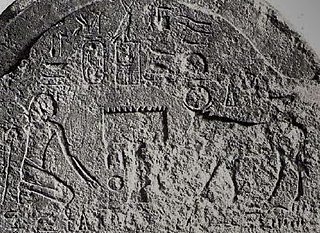 W
WCambyses II was the second King of Kings of the Achaemenid Empire from 530 to 522 BC. He was the son and successor of Cyrus the Great and his mother was Cassandane.
 W
WCassandane or Cassandana was an Achaemenian Persian noblewoman and the "dearly loved" wife of Cyrus the Great. She was a daughter of Pharnaspes. She bore four children for Cyrus : Cambyses II, who succeeded his father and conquered Egypt; Smerdis (Bardiya), who also reigned as the king of Persia for a short time; a daughter named Atossa, who later wed Darius the Great; and another daughter named Roxana.
 W
WCyrus I or Cyrus I of Anshan or Cyrus I of Persia, was King of Anshan in Persia from c. 600 to 580 BC or, according to others, from c. 652 to 600 BC. Cyrus I of Anshan is the grandfather of Cyrus the Great, also known as Cyrus II. His name in Modern Persian is کوروش, Kurosh, while in Greek he was called Κῦρος, Kȳros.
 W
WCyrus II of Persia commonly known as Cyrus the Great, and also called Cyrus the Elder by the Greeks, was the founder of the Achaemenid Empire, the first Persian Empire.
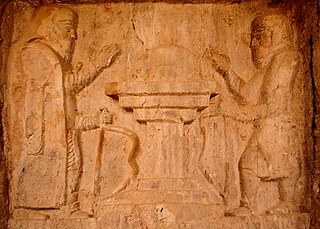 W
WCyaxares was the third and most capable king of Media, according to Herodotus, with a far greater military reputation than his father Phraortes or grandfather Deioces. He was the first to divide his troops into separate sections of spearmen, archers, and horsemen.
 W
WHydarnes I or Hidarnes I, also known as Hidarnes the Old by contrast with his son Hidarnes the Young, son of Bagābigna, was a Persian nobleman of the Orontid dynasty during the Achaemenid Empire in the late 6th and early 5th centuries BC. He was one of the seven conspirators against the usurper, Gaumâta, who killed him and then proclaimed Darius I as the Persian king. His name appears in the Behistun inscription among the six conspirators who supported the rise of Darius the Great. Hydarnes then served Darius I as a commander and remained influential during his reign.
 W
WHystaspes, Vishtaspa or Gustasp, was a Persian satrap of Bactria and Persis. He was the father of Darius I, king of the Achaemenid Empire, and Artabanus, who was a trusted advisor to both his brother Darius as well as Darius's son and successor, Xerxes I.
 W
WIntaphrenes was one of the seven who in September 522 BCE helped Darius I usurp the throne from Bardiya, following Bardiya’s alleged usurping of the throne of the Achaemenid Empire from Cambyses II. Intaphrenes then became Darius's bow carrier, a high position in which he is depicted in the Behistun Inscription.
 W
WMazares was a Median general who defected to Cyrus the Great when the latter overthrew his grandfather, Astyages and formed the Persian Empire. Mazares is mentioned by Herodotus as a Median general in the service of Cyrus the Great who died while putting down a revolt in Asia Minor.
 W
WMegabizus I, also Megabyzos, was an Iranian noble man during the Achaemenid Empire. On 522 BC he gave the throne to King Darius of Persian by killing Gaumata who pretended to be Bardiya, son of Cyrus the Great and legitimate pretender to the throne. He was a commander of Darius I's army in Europe
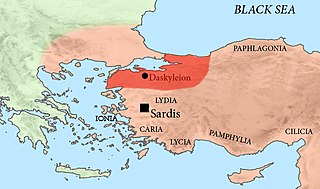 W
WMitrobates was an Achaemenid satrap of Daskyleion under the reigns of Cyrus the Great, by whom he was nominated, and Cambyses. After Cambyses died, and during the struggles for succession that followed, he is said to have been assassinated, together with his son Cranaspes, by the neighbouring satrap of Lydia, Oroetes, who had expansionist views on Anatolian territory. After that, Oroetes added the territory of Hellespontine Phrygia to his own territory of Lydia.After Cambyses had died and the Magians won the kingship, Oroetes stayed in Sardis, where he in no way helped the Persians to regain the power taken from them by the Medes, but contrariwise; for in this confusion he slew two notable Persians, Mitrobates, the governor from Dascyleium, who had taunted him concerning Polycrates, and Mitrobates' son Cranaspes; and besides many other violent deeds, when a messenger from Darius came with a message which displeased him, he set an ambush by the way and killed that messenger on his journey homewards, and made away with the man's body and horse. So when Darius became king he was minded to punish Oroetes for all his wrongdoing, and chiefly for the killing of Mitrobates and his son.
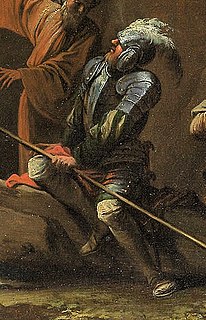 W
WOroetus, or Oroetes, was a Persian Satrap of Lydia from ca. 530-520 BC, during the reigns of Cyrus the Great, Cambyses and Darius the Great, succeeding Harpagus, and being followed by Bagaeus. He is described by Herodotus in the third book of his Histories, where he achieved notoriety for the death of Polycrates, tyrant of Samos:What I will now relate happened about the time of Cambyses' sickness. The viceroy of Sardis appointed by Cyrus was Oroetes, a Persian. This man purposed to do a great wrong; for though he had received no hurt by word or deed from Polycrates of Samos, nor had even seen him, he formed the desire of seizing and killing him. The reason alleged by most was this: — As Oroetes and another Persian, Mitrobates by name, governor of the province of Dascyleium, sat by the king's door, they fell from talk to wrangling and comparing of their several achievements: and Mitrobates taunted Oroetes, saying, "You are not to be accounted a man; the island of Samos lies close to your province, yet you have not added it to the king's dominion — an island so easy to conquer that some native of it rose against his rulers with fifteen men at arms, and is now lord of it. Some say that Oroetes, angered by this taunt, was less desirous of punishing the utterer of it than of by all means destroying the reason of the reproach, namely Polycrates.
 W
WOtanes, son of Sisamnes, was an Achaemenid judge and later Satrap of Ionia during the reign of Darius the Great, circa 500 BC.
 W
WPharnaces Ι was a son of Arsames. He was a younger brother of Hystaspes, and therefore an uncle of Achaemenid Emperor Darius I, son of Hystaspes. He was the founder of the Pharnacid dynasty that ruled over Hellespontine Phrygia.
 W
WSpargapises(From eastern Iranian: Saharkhizh) was a Massagetae general and son of the Massagetae queen Tomyris. Most of what history recounts of him is based on Herodotus's The Histories. Spargapises is part of the Massagetae forces that battled against Cyrus the Great. Little is known of his life aside from his contact with Cyrus during Cyrus's campaign to Jaxartes. Spargapises is eventually captured by the Persians and is granted freedom and a pardon by Cyrus the Great after a short period of incarceration. He would however eventually commit suicide after having learned of his blunder.
 W
WTabalus the Persian was the first satrap of Sardis. Cyrus the Great of Persia put him in place after conquering Lydia, c.546 BC. Herodotus mentions him in his histories :Presently, entrusting Sardis to a Persian called Tabalus, and charging Pactyes, a Lydian, to take charge of the gold of Croesus and the Lydians, he himself marched away to Agbatana, taking with him Croesus, and at first making no account of the Ionians. For he had Babylon on his hands and the Bactrian nation and the Sacae and Egyptians; he was minded to lead an army himself against these and to send another commander against the Ionians.
 W
WTritantaechmes was a king of the Sagartians, who ruled in Arbela.
 W
WZopyrus was a Persian nobleman mentioned in Herodotus' Histories.